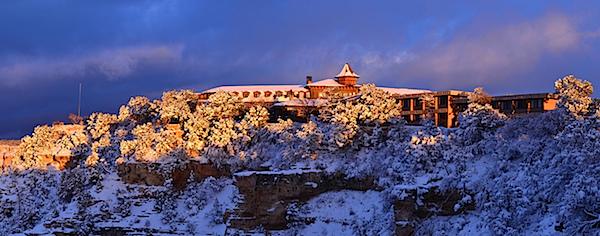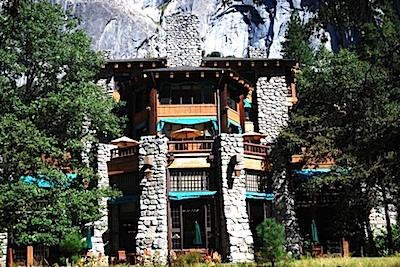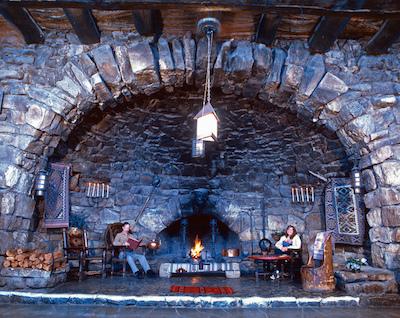
Xanterra Parks & Resorts has filed an application to trademark "El Tovar," and other lodging names on the South Rim of Grand Canyon National Park/NPS photo of El Tovar Hotel
Last fall, Xanterra Parks & Resorts was coming down to its last two months as concessionaire for the lodges and restaurants on the South Rim of Grand Canyon National Park. It had been unable to come to terms with the National Park Service over a new, 15-year pact that would take effect January 1, 2015, and had sued the agency over its contracting decisions. About the same time, Xanterra filed a slew of applications to trademark the names of those iconic lodges and restaurants covered by the contract.
Those applications, currently pending with the U.S. Patent and Trademark Office, come in the wake of news that Delaware North Co. had laid claim to trademarks to place names in Yosemite National Park, including that to The Ahwahnee Hotel, perhaps the grande dame of national park lodging.
Trademarking place names within the National Park System is not new for many products unrelated to the daily operations of a park. Old Faithful isn't just the name of a geyser, it's also tied to a gun. Denali is a national park in Alaska, and it's also a baby stroller and a medical device. Grand Teton National Park towers above Wyoming's western border, and "Grand Teton" is also a cheese and a vodka. But it's the trademarks taken out or applied for, some in recent months, on lodges and places within national parks that perhaps best underscore John Muir's belief that "nothing dollarable is safe."
Muir's full comment -- "Nothing dollarable is safe, however guarded. Thus the Yosemite Park, the beauty glory of California and the Nation, Nature's own mountain wonderland, has been attacked by spoilers ever since it was established, and this strife I suppose, must go on as part of the eternal battle between right and wrong." -- was made in 1908 in the wake of a move by the City of San Francisco to dam the Hetch Hetchy Valley in Yosemite National Park to create a reservoir for its water needs.
Leap ahead 106 years and Muir's fears are ringing loudly as concessions companies lay claim to trademarks for lodges they operate in the park and, at least in one case, place multi-million-dollar numbers to those trademarks if they lose the contract to operate those lodges.
Businesses have been making money off park names and places for decades. General Motors Corp. has taken names of parks -- Acadia and Denali, just to cite two -- and attached them to some of their vehicles. The Ballard Rifle & Cartridge Co. of Powell, Wyoming, received the "Old Faithful" trademark in 2008 for some of its firearms, while the Idaho Candy Co. trademarked some of its confections "Old Faithful" back in 1926.
Software companies have both trademarked park names and, in the case of Apple with its "Yosemite" operating system, simply affixed them to their products.

Delaware North maintains that it owns the trademark to The Ahwahnee Hotel, and won't relinquish it without compensation/Kurt Repanshek
In products unrelated to national parks, the use of park names, whether trademarked or not, might not outwardly pose a serious problem. But in the case of Delaware North Co. at Yosemite, Xanterra Parks & Resorts at Grand Canyon National Park, and the Grand Teton Lodge Co. in Grand Teton, the trademarking of place names and lodges could pose a threat to the historical integrity of the parks as well as a possible impediment to the Park Service's efforts to develop a competitive process for awarding concessions contracts, a process that should be in the best interests of the visiting public.
Delaware North (DNC) had garnered the most attention of late for its trademark claims to The Ahwahnee Hotel, Curry Village, the Wawona Hotel, and Badger Pass. It also received a trademark for "Bracebridge Dinner," a sumptuous year-end, yuletide feast with music and pagentry that has been conducted annually at The Ahwahnee since 1927.
When the Park Service last year prepared a prospectus for companies interested in running concessions in Yosemite, officials for Delaware North notified the agency that DNC had trademarks to various lodges and locations in Yosemite. If it lost the bidding for the 15-year concessions contract that begins in 2016, DNC would require the winning bidder, as part of its Leaseholder Surrender Interest, to pay $51 million for the right to those names. The concessionaire has said that when it acquired the Yosemite Park & Curry Co. in 1993, among the assets it acquired were the intellectual property, ie., the trademarks on place names to the lodges and Badger Pass.
Should the Park Service require that any concessionaire that succeeds Delaware North pay that company $51 million to retain the place names, or should a new concessionaire be given the option to avoid paying that fee by renaming those historic lodges and facilities, and so figuratively erase part of the park's history?
So far the Park Service has not officially recognized Delaware North's claim, but it has in the prospectus left open the door for renaming all the places to which the claim extends if another company wins the contract. As a result, for example, the hotel known since 1927 as "The Ahwahnee" could go by a different name.
At the same time, the Interior Department's Office of the Solicitor is looking into the matter to see if Delaware North can legally trademark those place names, which date back many decades and which Park Service officials consider part of the historical landscape and vernacular of the park.

Xanterra also has applied for a trademark to "Hermit's Rest."/NPS
A search of the U.S. Patent and Trademark Office shows that other concessionaires also have laid claims to names in other national parks. Xanterra Parks & Resorts, which last October announced its intent to sue the Park Service over its concessions contract, that same month filed an application to trademark the name "El Tovar," which is attached to the famous hotel on the South Rim of the canyon. Within two weeks of that application, Xanterra made similar applications to trademark the names of virtually all commercial businesses on, and below, the South Rim: "Phantom Ranch," "Bright Angel Lodge," "Kachina Lodge," "Yavapai Lodge," "Maswick Lodge," "Red Horse Cabin," "Arizona Room," "Lookout Studio," "Buckey O'Neill Cabin," "Thunderbird Lodge," "Trailer Village,""Hopi House," "Hermit's Rest," and "Desert View Watchtower."
All of those applicatons are pending while the patent office reviews them.
Xanterra officials could not be reached Sunday to explain why they applied for the trademarks at a time when they had little more than two months left on their concessions contract, and had not bid on the new pact.
In response to Xanterra's lawsuit, the Park Service argued that Xanterra was trying to thwart competition and that the concessionaire felt that its history on the South Rim entitled it to remain there. While the lawsuit is still pending, the Park Service and Xanterra have come to terms on a temporary one-year contract to allow the company to continue running the concessions while the Park Service works to award the longer term, 15-year contract.
Another park concessionaire, Grand Teton Lodge Co., back in August 2005 received a trademark to "Jenny Lake Lodge," an opulent lodge in the national park. The trademark was renewed in September, according to patent office records.



Comments
re: "believe the naming rights were not an issue in NPS not receiving any bids. It was the actual prospectus."
I agree. My comment about the naming rights was intended as a little humor.
Trail, the article says that it would pay as part of the LSI $51 mil for naming rights. Its not clear if the naming rights could be seperated from the LSI thereby reducing the price paid by the $51 mil nor how the $51 mil number was derived. Was that part of the "arbitrated" valuation? As we dig deeper there seems to be more questions than answers.
Sara, thanks for clarifying.
I wonder what the actuallities were that got NPS to consider other options. What were they, specifically. Maybe if they both got to the point instead of playing things out in court. A little self examination on it's operating model by Xanterra? Maybe Mr. Anschutz should bang a few corporate heads together and instill some character in the leadership and let it trickle down. Naive, I suppose but I love breakthroughs.
Not sure who's the good or bad guy here (or the legal one). The Fred Harvey (Xanterra) History along with the Kolb's have always had an interesting relationship with NPS. Cultural History, both historical and present, has always been evolving politically one way or another and seldom conveys realities (Good, bad & ugly). Most all of those structures that were mentioned were commissioned by Fred Harvey Company, including that most beautiful alcove fireplace at Hermits Rest. To ignore Mary Jane Colter's contributions working for Fred Harvey Company because they like to make money also would be a pretty narrow view. NPS likes to make and receive money, also. Would like for the sum of NPS & Xanterra's (I actually prefer Fred Harvey Co.) involvement at the Canyon be raised to a higher plane. Work it out please. You both could use some improvement.
No one has to change the names. They belong to the American people. Can I prove it? No one has to. They are part and parcel of the national parks. The national parks are owned by the American people. Every concessionaire conducts business in the parks at our pleasure. And I believe we want to keep our names.
What is happening here is this: The Park Service is failing its history again in the pursuit of a management euphemism, "partnership." There is no partnership, nor is there a "senior" partner, as the Park Service often calls itself. There are the American people and everyone else. The Park Service is there to defend the NATIONAL interest. Why don't they? Because that would mean standing up to everyone who wants to be a "partner." It would mean having to abide by the Organic Act instead of the latest commercial buzz.
We the American People own the parks. We the American People own the names. You want me to prove it historically--and legally? I can. The point still remains that no one has to. The claims are bogus and should not be treated as if they have any standing, for in fact they never did. When you do business in the parks, you forfeit your right to lay claim to the parks--in whole or in part. You buy a privilege only and no other right to the parks.
Ah, but that means saying no again to the partners. Falling back on a euphemism is so much easier, and pays far better at the executive ranks. Well, this is the ultimate test, is it not? Now we will see if indeed we have a NATIONAL Park Service that values history over spin.
Re: "History (real) over spin)." That's a good one, Mr. Runte. Sounds rather selfless. I like that, in the real sense. Someone has to begin, however.
Alfred - I sympathize with your sentiment. However, DNC claims their contract calls for them (and any other operator) to buy on assumption of a contract and sell on exiting, the tangible and intangible assets of the existing operator - which includes the trademarks. Do you dispute that? If so, where exactly do you disagree. Yes the Parks belong to the American People, but if a concessionaire adds value, it would seem he should be compensated.
Hi EC,
I dispute (and history disputes) that there ARE "intangible" assets. That might be true for a private business "outside" the park; inside the park, what is "intangible?" The whole reason there are "assets" of any kind, whether tangible or intangible, is because the place is a national park. If DNC is entitled to charge for its "intangible" assets, what should the public charge DNC for making them possible? They would not exist without the park.
From Abraham Lincoln on, we the American people are the ones who gave "value" to the place, just as now the National Park Service, i.e., the public, are the ones protecting that value for the public AND the concessionaire. Without the public's park--and without the public's infrastructure--there is no value in the place.
Then to suggest that the place names "belong" to someone? They may be "intangible," but they are ours? Even more amazing, the Park Service "forced" us to buy them? How about they never existed as a saleable asset in the first place? What the Park Service meant 25 years ago (and properly meant) was that the name Yosemite and all of its derivatives belonged to the American public. But of course "the company" calls it Yosemite Lodge. What the hell else would you call it? The New York Biltmore?
And I hope no one tells me that the "franchise fee" is anything other than a fee for the privilege. It is a privilege to do business in our national parks. But that is all it is. The public owns the parks, both tangible and intangible, and I dearly hope that the Supreme Court gets to clear the air. The court did once, but we seem to have forgotten that. After all, who reads history anymore, and even when they do pretend to read it, dare to know what it means? In this case it means a public relations nightmare, unless those names go back to the public where they belong. After all, I don't recall that I ever parted with them for the privilege of staying at The Ahwahnee, Inc.